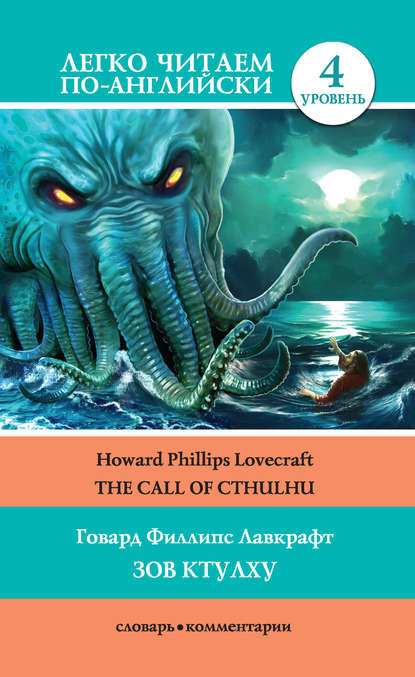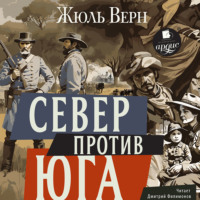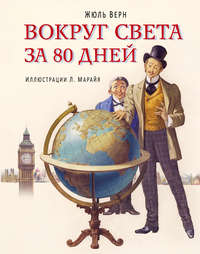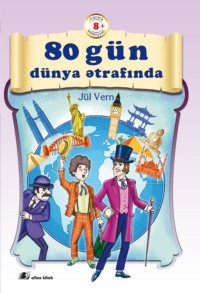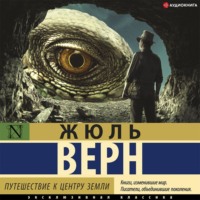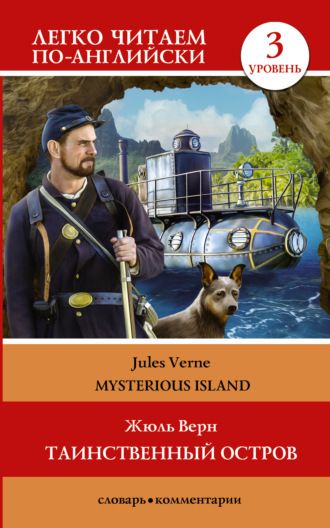
Полная версия
Таинственный остров / The Mysterious Island. Уровень 3
They did not speak, their hunting was fruitless. Birds were singing and flying under the trees; but they showed an instinctive fear of the men. Among fir trees were fluttering birds with small bodies and long, glittering tails.
– These are couroucous[22] , – said Herbert. – Their meat is delicious. Besides, I think we can easily get at them with our sticks.
They used their sticks like a scythe, and they mowed down whole rows of the couroucous, of whom 105 were killed.
Then they saw a river. They followed it downward. And by 6 o’clock, Herbert and Pencroff re-entered the Chimneys.
Chapter VII
Gideon Spilett stood motionless upon the shore. He was gazing on the sea. The wind, already strong, was freshening, and the heavens had an angry look. Pencroff began to prepare dinner. At 7 o’clock Neb was still absent.
The storm began. A furious gust of wind passed over the coast from the southeast. At 8 o’clock Neb did not return. The birds were all they had for supper, but the party found them excellent. Pencroff and Herbert devoured them. Then each one retired to his corner, and Herbert was soon asleep.
It was about 2 o’clock when Pencroff suddenly woke up. The reporter was shaking him.
– What’s the matter? – Pencroff cried.
The reporter was bending over him and saying:
– Listen, Pencroff, listen!
The sailor listened, but could hear nothing interesting.
– It is the wind, – he said.
– No, – answered Spilett, – listen again! I think I heard…
– What?
– The barking of a dog!
– A dog! – cried Pencroff.
– Yes, the barking.
– Impossible! – answered the sailor.
– Wait and listen, – said the reporter.
Pencroff listened most attentively, and he caught the sound of distant barking.
– Is it? – asked the reporter.
– Yes, yes! – said Pencroff.
– It is Top! It is Top! – cried Herbert, and the three rushed to the entrance of the Chimneys. The darkness was absolute. Sea, sky, and earth were black.
For some moments the reporter and his two companions stood in this place. Then again, in the hush of the storm, they heard, far away, the barking of a dog. This must be Top. But was the dog alone?
It was indeed Top. But he was alone! Neither his master nor Neb accompanied him. It seemed inexplicable how, through the darkness and storm, the dog came to the Chimneys. Herbert drew the dog towards him; and the dog rubbed its neck against the lad’s hands.
– Top will guide us to its master! – said Herbert.
Pencroff made no objection. The tempest was terriblr. It was difficult to follow a straight course. The better way, therefore, was to trust to the instinct of Top. The reporter and the lad walked behind the dog, and the sailor followed after. The rain was not heavy, but the strength of the storm was terrible.
Probably, Neb found his master and sent the faithful dog to them. But is the engineer dead?
– Saved! He is saved! Isn’t he, Top? – repeated the boy. And the dog barked.
By 4 o’clock the wind was drier and colder. No murmur passed their lips. They were determined to follow Top wherever he wished to lead them.
At 5 o’clock the sailor and his companions were six miles from the Chimneys. Top ran ahead, returned, and ran again. The dog left the coast, and walked among the downs. The border of the downs was composed of hills and hillocks. It was like a little Switzerland of sand, but a dog instinct could find the way.
Five minutes after the reporter and his companions reached a hollow, before which Top stopped with a loud bark. The three entered the cave. Neb was there, he was kneeling beside a body upon a bed of grass. It was the body of Cyrus Smith.
Chapter VIII
Neb did not move. The sailor uttered one word.
– Alive? – he cried.
Neb did not answer. Herbert stood motionless. It was evident that the poor servant did not hear the voice of the sailor.
The reporter knelt down beside the motionless body, and pressed his ear to the chest of the engineer. Then he tried to detect some movement of the heart.
Gideon Spilett, after a long and attentive examination, rose up.
– He lives! – he said.
Pencroff knelt down beside Cyrus Smith; he also detected some heartbeats. Herbert hurried in search of water. Soon he found a brook; so the lad soaked his handkerchief in the stream, and hastened back with it to the cave.
The drops of fresh water produced an instantaneous effect. A sigh escaped from the breast of Smith.
– We will save him, – said the reporter.
Neb removed the clothing from his master. Neither on his head nor body nor limbs was there a bruise or even a scratch. That was astonishing.
– You thought he was dead? – asked the sailor Neb.
– Yes, I thought so, – answered Neb. – And I wanted to die beside my master.
Then Neb told them everything. Neb followed along the coast to the north, until he reached that part of the beach. There he searched the shore, the rocks, the sand for any marks. He did not hope to find his master. Then he decided to continue some miles further up the coast.
– I followed the shore two miles further, and yesterday evening, about 5 o’clock, I discovered footprints upon the sand.
– Footprints?! – cried Pencroff.
– Yes, sir, – replied Neb.
– And did they begin at the water? – demanded the reporter.
– No, – answered Neb, – above high-water mark. The sight of these footprints made me wild with joy. They went towards the downs. I followed them for a quarter of an hour. Five minutes later, I heard a dog bark. It was Top. And he brought me here, to my master.
– So you, Neb, – said the reporter, – did not bring your master to this place?
– No, it was not I, – answered Neb.
It was a real mystery. But they must carry Cyrus Smith to the Chimneys as soon as possible.
Soon the engineer opened his eyes. Neb and the reporter were leaning over him.
– My master! my master! – cried Neb.
The engineer heard him. He recognized Neb and his companions.
– Is it an island or a continent? – he murmured.
– What is the difference? – cried Pencroff, unable to restrain the exclamation, – you are alive! Island or continent? We will see that later.
The engineer seemed to sleep. The sailor was repeating:
– Island or continent! To think of that! What a man!
Pencroff and his companions constructed a litter, which they covered with leaves and grass. This work occupied some little time, and it was 10 o’clock when the three returned to Smith and Spilett.
The engineer woke from the sleep. The color came back to his lips. He raised himself slightly, and looked about.
– Well, – said the sailor, – Mr. Smith, your litter is ready, and we will carry you to our house.
– Thanks, my friend, – replied the engineer. – in an hour or two we will go.
The reporter related everything.
– But, – asked Smith, in a feeble voice, – you did not pick me up on the beach?
– No, – replied the reporter.
– And it was not you who brought me to this hollow?
– No.
– How far is this place from the reef?
– At least half a mile, – replied Pencroff, – and we are very surprised to find you here. But cannot you remember anything that happened after you were washed away?
Cyrus Smith tried to think, but he remembered little. The wave swept him from the net of the balloon. Then Top sprang to his rescue. Smith found himself in the midst of the tumultuous sea, more than half a mile from shore. He was swimming vigorously against the waves; but a strong current seized him. It carried him to the north, and soon he sank into the abyss. From that moment he remembered nothing.
– It’s strange, – said the reporter. – Did anyone rescue you from the waves?
– That is inexplicable.
Towards noon, Pencroff asked Smith if he felt strong enough. Fortunately, the rain stopped. At half past 5 the little party reached the Chimneys.
Chapter IX
The engineer was sleeping. First of all, they carried Cyrus Smith into the main corridor. There they were able to make for him a couch of seaweeds. The supper this evening consisted of the lithodomes.
The next day, the 28th of March, when the engineer awoke, about 8 o’clock, he saw his companions beside him, and, as on the day before, his first words were,
– Island or continent?
It was his one thought.
– Well, Mr. Smith, – answered Pencroff, – we don’t know.
– You haven’t found out yet?
– But we will, – affirmed Pencroff, – when you are able to guide us in this country.
– I believe that I am able to do that now, – answered the engineer, who rose up.
– That is good, – exclaimed the sailor.
– When you were carrying me here yesterday, did I not see a mountain in the west?
– Yes, – said Spilett, – quite a high one.
– All right, – exclaimed the engineer. – Tomorrow we will climb to its summit and determine whether this is an island or a continent.
– But, – asked Spilett, – where has this storm thrown us, Cyrus?
– In truth, I cannot say, – replied the engineer, but the probability is that we are somewhere in the Pacific. When we left Richmond the wind was northeast, and its direction did not vary much. We crossed North and South Carolina[23] , Georgia[24] , the Gulf of Mexico[25] , and the narrow part of Mexico, and a portion of the Pacific Ocean. I estimate the distance less than 6,000 or 7,000 miles. But if this coast belongs to some barren island in the Micronesian Archipelago[26] , perhaps we will never leave it.
– Never? – cried the reporter. – Do you say “never”, my dear Cyrus?
– We will know how to act when we first ascend the mountain, – answered Smith.
– But will you be able, Mr. Smith, to make the climb tomorrow? – asked Herbert.
– I hope so, answered the engineer, – if Pencroff and you, my boy, are good hunters.
Chapter X
The three hunters were seating before a fire. Beside them sat Cyrus Smith and the reporter.
– Yes, my good fellow, – said the reporter, – a fire, a real fire!
– But who lighted it? – said the sailor.
– The sun.
The sailor could not believe his eyes.
– Do you have a burning-glass[27] , sir? – asked Herbert of Cyrus Smith.
– No, my boy, said he, but I made one.
And he showed his lens. It was simply the two glasses, from his own watch and the reporter’s. He took them out, filled with water, and put together with some clay. Thus he made a veritable burning-glass, and concentrated the solar rays on some dry moss.
With the help of Neb, the sailor arranged the spit. The engineer and his companion made good use of their day[28] . Smith recovered his strength. They had a pleasant supper. The engineer said little; he was planning for the next day. After supper, the party lay down to sleep. The morning found them fresh and eager for the expedition.
Everything was ready. At half past 7 they left the Chimneys, each with a stout cudgel. By Pencroff’s advice, they took the route of the previous day, which was the shortest way to the mountain. They turned the southern angle, and followed the left bank of the river. They took the path under the evergreens, and soon reached the northern border of the forest. The soil was flat and swampy, then dry and sandy. Among the trees appeared a few animals. The engineer was going to the top of the mountain.
The mountain was composed of two cones. The first was truncated about 2,500 feet up, and supported by fantastic spurs. Between these spurs were narrow valleys. On the northeast side of the mountain, vegetation was scanty.
On the first cone lay the second one, slightly rounded towards the summit. The surface seemed bare. The object of the expedition was to reach the top of this cone, and their best way was along the edge of the spurs.
– We are in a volcanic country, – said Cyrus Smith, as they began to climb. They were gradually ascending. At noon, when the little company halted to dine, they were still half way from the first plateau, and could hardly reach it before nightfall. From this point the sea was beneath their feet. On the left they could see directly north for several miles; but the northwest was concealed from them.
At 1 o’clock, the ascent again began. The easiest route slanted upwards towards the southwest, through the thick copse. The climbers reached a terrace, almost bare of trees, whose soil was evidently volcanic. From hence, their course was a zigzag towards the east. Neb and Herbert led the way, then came Smith and the reporter; Pencroff was last.
They all stopped fifty feet from large animals, with thick horns curved backwards and flattened at the end, and with woolly fleece. They were not the common sheep. Their name, according to Herbert, was а Moufflon[29] .
As the ascension continued, the traces of lava were more frequent, and little sulphur springs[30] intercepted their route. As they neared the first plateau, the ascent became very difficult. By 4 o’clock they passed the last belt of trees. Fortunately for the engineer and his party, it was a pleasant, mild day. The sky overhead was extremely bright and clear. A perfect calm reigned around them. The sun was hidden by the upper mountain, which cast its shadow westward to the edge of the sea.
There were only 500 feet between the explorers and the plateau where they wanted to encamp for the night. It was almost night when the party arrived at the top of the first cone.
Now they must pitch their camp, and think of supper and sleep. The sailor built up a fireplace with huge stones. Neb and Herbert soon brought a load of thistles.
The night was beautiful and still; and not very dark. They walked together in silence. Sometimes the plateau was wide and easy, sometimes very encumbered with rubbish. There were yet 1,000 feet to climb. Fortunately, the long and sinuous declivities made a staircase, and greatly helped their ascent. The volcano was not only quiet, but extinct.
It was nearly 8 o’clock when they set foot on the summit[31] of the cone. The darkness was by this time complete, and they could hardly see around them. Was the land an island or a continent? They could not yet discover. At one point of the horizon suddenly appeared a vague light. The line of the horizon was now cloudless, and as the moon touched it, the engineer seized the boy’s hand.
– An island! – said he.
Chapter XI
Then they walked back to the camp. The country is an island, and tomorrow they will consider what to do.
The next day, March 30, after breakfast, they started out for the summit of the volcano. All desired to see the isle. Maybe they will spend their lives here. It was about 7 o’clock in the morning when they left the camp.
– Bah! – said Pencroff, – we got out of Richmond without the permission of the authorities, and it will be strange if we can’t get away from this place!
It was a superb day, and the southern side of the mountain was sunny. The crater was a huge shaft gradually opening to a height of 1,000 feet above the plateau. The interior of the crater was easily scaled. They saw on the way traces of ancient lava. As to the volcano chimney, its depth was lost in obscurity. Before 8 o’clock, they were standing at the summit of the crater.
– The sea! the sea everywhere! – was their exclamation. There it lay, an immense sheet of water around them on every side. Nothing appeared to the horizon-line, a radius of more than fifty miles. Not a sail was in sight. Around the island stretched an ocean.
Silent and motionless, they surveyed every point of the horizon. Then they looked down upon their island. Spilett asked:
– How large do you think this island is?
– It seemed small enough in the midst of the infinite ocean.
– My friends, – said Smith, – I think, the coast of the island is more than 100 miles around.
If Smith was right, the island was about the size of Malta[32] ; but it was more irregular than it. The eastern coast was a curve, it was embracing a large bay. On the northeast, two other capes shut in the bay, and between them lay a narrow gulf. From northeast to northwest the coast was round and flat, like the skull of a wild beast. Then came a hump, whose centre was occupied by the volcanic mountain. From this point the coast ran directly north and south. For two-thirds of its length it was bordered by a narrow creek; then it finished in along cue, like the tail of a gigantic alligator. The narrowest part of the island, between the Chimneys and the creek, on the west, was ten miles wide, but its greatest length was not less than thirty miles.
The southern part, from the shore to the mountain, was covered with woods; the northern part was arid and sandy. Between the volcano and the eastern coast there was a lake, surrounded by evergreens.
– So, it is a fresh water lake? – asked Pencroff.
– Yes, of course, – said the engineer.
– I can see a little river there, – said Herbert. He was pointing to a narrow brook.
The volcano did not occupy the centre of the island. It rose in the northwest. On the southwest, south, and southeast, the beginnings of the spurs were lost in masses of verdure.
They remained for an hour at the summit of the mountain. The island lay stretched before them. They understood the configuration of the entire island, but there remained a great question: was the island inhabited? It was the reporter who put this question. Nowhere could they perceive the handiwork of man; no late settlement on the beach, not even a lonely cabin or a fisherman’s hut. No smoke.
The exploration of the island was finished. They drew a map of it, and calculated its size. They wanted now to descend the declivities of the mountain, and to examine into the animal, vegetable, and mineral resources of the country. But before the departure, Cyrus Smith, in a calm, grave voice, addressed his companions.
– Look, my friends, upon this little corner of the earth. Here, perhaps, we may long dwell.
– Mr. Smith, – said the sailor, – we will make a little America here. We will build cities, lay railroads, establish telegraphs. We will be not castaways, but colonists. Well, let’s start!
– One minute, my friends, – said the engineer; – let’s name the island, the capes, promontories, and water-courses.
– Yes, – said Smith, – for instance, let us call the great bay to the east Union Bay[33] , the southern indentation Washington Bay[34] , the mountain on which we are standing Mount Franklin[35] , the lake beneath our feet Lake Grant[36] . These names will recall our country and its great citizens. What will you say, my friends?
The engineer’s proposal was unanimously applauded. Spilett put down the names over the proper places, and the geographical nomenclature of the island was complete.
– Now, – said the reporter, – to that peninsula projecting from the southwest I propose to give the name of Serpentine Peninsula[37] , and to call the twisted curve at the termination of it Reptile End [38] . It is just like a snake’s tail.
– And the other extremity of the island, – said Herbert, – the gulf is like a pair of jaws, let us call it Shark Gulf[39] .
– Good enough, – said Pencroff, – and we may call the two capes North Mandible[40] and South Mandible[41] . Now we must name the southwestern extremity of the island.
– Claw Cape[42] , – suggested Neb.
The river with fresh water they called the Mercy[43] . The islet on which they first arrived, was Safety Island[44] ; the plateau at the top of the high granite wall above the Chimneys, from which the whole sweep of the bay was visible, Prospect Plateau [45] . And, finally, that mass of impenetrable woods which covered Serpentine Peninsula, the Forests of the Far West[46] .
The colonists were going to descend the mountain, when Pencroff cried:
– Why, what idiots we are!
– Why so? – said Spilett, who had closed his note-book.
– We have forgotten to name our island!
Cyrus Smith said quietly:
– Let us give it the name of a great citizen, my friends, of the defender of American unity! Let us call it Lincoln Island[47] !
Chapter XII
The colonists of Lincoln Island walked around the verge of the crater. Half an hour afterwards they were again upon the lower plateau. Pencroff thought it was breakfast time.
As they were leaving the plateau, Smith proposed to his companions to take a new road back to the Chimneys. He wished to explore Lake Grant. The colonists used only the names which they invented, and found that they could express themselves much more easily. Herbert and Pencroff were delighted, and the sailor said as they walked along:
– Well, Herbert, this is jolly! We can’t lose ourselves now, my boy, since, whether we follow Lake Grant or get to the Mercy through the woods of the Far West, we must come to Prospect Plateau, and so to Union Bay.
Pencroff, Herbert, and Neb walked in front, preceded by Top, who poked his nose into every corner. The reporter and engineer walked together. The reporter was ready to note down every incident, the engineer seldom spoke, and was picking up sometimes one thing, sometimes another, vegetable or mineral, which he put in his pocket.
About 10 o’clock the little company descended the last declivities of Mount Franklin. A few bushes and trees were scattered over the ground. They were walking on a yellowish soil, which extended to the border of the wood. Suddenly they saw Herbert, he was running back.
– What’s the matter, my boy? – said Spilett.
– Smoke, – answered Herbert. – We saw smoke, it was ascending from among the rocks, a hundred steps in front.
– Men in this region! – cried the reporter.
– We must not show ourselves till we know with whom we have to deal, – answered Smith. Where is Top?
– Top is on ahead.
– And did it bark?
– No.
– That is strange. Still, let us try to call him back.
In a few moments the three rejoined their companions. They saw, very evidently, a yellowish smoke. Top was recalled by a low whistle from his master.
– Nature is responsible for that smoke, – said Smith, – It is nothing but a sulphur spring[48] , which will be good for our sore throats.
– Good! – said Pencroff; – what a pity that I haven’t got a cold!
The colonists walked towards the smoke. There they beheld a spring of sulphate of soda, which flowed in currents among the rocks, and whose waters, absorbing the oxygen of the air, gave off a lively odor. Smith dipped his hand into the spring and found it oily.
The colonists walked towards the thick border of the forest, a few hundred paces distant. There they saw a brook with bright limpid waters between high, reddish banks. Its color showed the presence of oxide of iron. They named the water course Red Creek[49] . It was a large mountain brook, deep and clear. It was a mile and a half long; its breadth varied from thirty to forty feet. Its water was fresh.
Happily, there was neither wild beast nor savage native, but merely mountain pheasants. Some crows and magpies flew about. The colonists had nothing but stones and sticks, very insufficient weapons. Suddenly a troop of quadrupeds[50] leaped away through the underbrush.
– Kangaroos! – cried Herbert.
– Can you eat them? – said Pencroff.
– They make a delicious stew, – said the reporter.
The sailor with Neb and Herbert rushed after the kangaroos. Smith tried in vain to recall them. After five minutes’ chase, they came back.
– You see, Mr. Smith, – said Pencroff, – we need guns. Will it be possible to make them?
– Perhaps, – replied the engineer; – but first we will make bows and arrows.
– Bows and arrows! – said Pencroff. – They are for children!
– Don’t be so proud, my friend, – said the reporter. – Bows and arrows were sufficient for many centuries for the warfare of mankind. Powder is an invention of yesterday.






